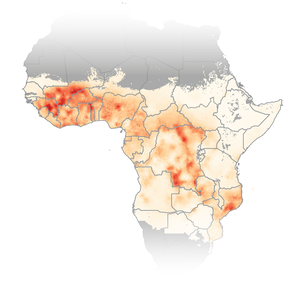Our work
There is a global call to eradicate malaria within our lifetimes.
Many places have never come close to eliminating malaria.
Some places have come close but did not success in maintaining elimination. Other places are still struggling to reduce morbidity and mortality under limited resources. How can modeling help us design effective, efficient strategies for malaria control, elimination, and eradication? |
2015 Plasmodium falciparum prevalence in children ages 2-10.
Data courtesy of the Malaria Atlas Project (Bhatt et al. Nature 2015). |
Our Team
We are looking for great people at all levels with strong quantitative skills and an interest in global health to come work with us! Previous malaria or infectious disease experience a plus but not required. Contact us here to express your interest and speak further with our team.
Why join the team?
Make a difference in the world. Disease kills hundreds of thousands of people every year. Help policy makers figure out how to save lives with a limited budget.
Work on interesting problems that span disciplines. Our models need to capture processes over a huge range of spatial scales and timescales. Whether you're interested in basic science, product development, or global eradication strategy, there's a problem here for you!
Create the culture of science you want to see. Help build a team culture of positive, collaborative science that extends beyond the walls of Northwestern to the broader health policy world.
Work on interesting problems that span disciplines. Our models need to capture processes over a huge range of spatial scales and timescales. Whether you're interested in basic science, product development, or global eradication strategy, there's a problem here for you!
Create the culture of science you want to see. Help build a team culture of positive, collaborative science that extends beyond the walls of Northwestern to the broader health policy world.
Our Community
@NorthwesternAt the Feinberg School of Medicine, we are part of the Department of Preventive Medicine (Epidemiology division), the Institute for Public Health and Medicine (IPHAM), and the Institute for Global Health's Center for Global Communicable and Emerging Infectious Diseases.
We are members of the Northwestern Institute on Complex Systems (NICO) and courtesy members of the Department of Industrial Engineering and Management Sciences.
|
Global partnersWe collaborate with academic, NGO, and malaria control programs around the world, including the Global Malaria Programme at the World Health Organization. We are founding members of the Applied Malaria Modeling Network (AMMnet). We are affiliate members of the Institute for Disease Modeling in Seattle, Washington.
|
